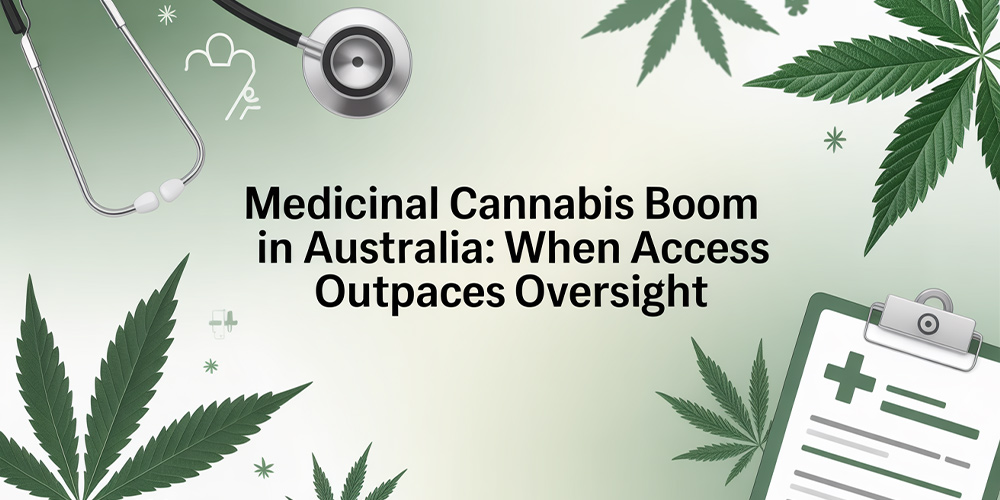
Home » Medicinal Cannabis Boom in Australia: When Access Outpaces Oversight
Medicinal Cannabis Boom in Australia: When Access Outpaces Oversight
Australia’s medicinal cannabis sector has seen a dramatic surge in prescriptions, especially of high‑THC products, driven in large part by telehealth clinics and online “single‑issue” providers. But regulators warn this growth is not without cost: patient safety concerns, inadequate medical assessment, and profit‑driven models whose oversight is still catching up. The Australian Health Practitioner Regulation Agency (AHPRA), TGA, and medical professional bodies are now pushing new guidance and investigations in response.
Key Facts & What’s Been Revealed
- Prescription volumes are surging
- Between July and December 2024, about 441,000 new patients were treated for category‑five (strong/THC‑heavy) medicinal cannabis products. (ABC News)
- Some individual medical practitioners have issued more than 10,000 scripts for such products in just six months; one allegedly issued over 17,000 in that period. (ABC News)
- Nurses and pharmacists are also involved: e.g. one pharmacist dispensed nearly a million cannabis products in a year (≈2,600/day). (ABC News)
- Telehealth & business model concerns
- Many medicinal cannabis prescriptions are issued through telehealth or online clinics. Some consultations are very brief (a few seconds or minutes). (ABC News)
- Certain clinics operate under a “vertically integrated” model: prescribing, dispensing, and supplying the products themselves. This can lead to conflicts of interest. (Brisbane Times)
- Advertising and online questionnaires that “coach” patients to respond in ways likely to lead to a prescription have been flagged as problematic. (AHPRA)
- Regulatory response & patient safety risks
- AHPRA has taken action against 57 practitioners (doctors, pharmacists, nurses) over concerns around medicinal cannabis prescribing practices, and is investigating another ~60. (ABC News)
- New guidance has been issued: prescribing should not be first‑line except in well‑supported conditions (cancer, MS, chemotherapy nausea, childhood epilepsy, muscle spasms). (ABC News)
- Prescribers must fully assess mental health and substance use histories; develop exit strategies for treatments; maintain medical records; ensure identity verification and track dispensing across systems. (ABC News)
- Unapproved medicinal cannabis products dominate
- The majority of medicinal cannabis products prescribed in Australia are unapproved by the TGA: i.e. they have not passed the formal safety, efficacy, or quality assessments required for registered drugs. (ABC News)
- These are accessed via authorisation schemes (Special Access, Authorised Prescriber) which are intended for medical need when no approved alternative exists. (AMA)

The Problems & Implications
- Risk of patient harm: Reports of psychosis, hospitalisations, and deaths linked to inadequate screening. (ABC News)
- Ethics & conflict of interest: Vertically integrated clinics may prioritise profits over patient care. (AHPRA)
- Adherence to medical standards: Short consultations and poor record‑keeping may breach professional codes. (ABC News)
- Regulatory lag: Access to products has grown faster than regulation, leaving gaps in oversight. (Health Services Daily)
Regulation, Reform & What’s Being Done
- New Guidance from AHPRA & National Boards: Stronger rules for prescribers, highlighting patient safety and professional standards. (ABC News)
- TGA Consultation on Unapproved Products: Process underway to raise safety and efficacy standards. (AMA)
- AMA & PSA Involvement: Both groups calling for more robust oversight of prescribing and dispensing. (AMA)
- Investigations & Enforcement: AHPRA probing high‑volume prescribers and scrutinising telehealth business models. (Brisbane Times)

Challenges & Open Questions
- Balancing access vs safety for patients with chronic conditions.
- Ensuring quality and consistency of unapproved products.
- Enforcing compliance in online/telehealth models.
- Monitoring long‑term outcomes and adverse events.
- Protecting vulnerable populations from misuse while enabling access.
What This Means for Stakeholders
- Patients: Must understand risks, approval status, and evidence base.
- Doctors/Nurses/Pharmacists: Adhere to guidance, document properly, prioritise safety.
- Policymakers/Regulators: Update frameworks, increase transparency, strengthen oversight.
- Industry: Risk of penalties and reputational damage; need for compliance.

Looking Ahead
- Expect tighter regulation of unapproved products via TGA reforms.
- Potential new rules for telehealth prescribing.
- More transparency in prescribing data and adverse event reports.
- Pressure for clinical trials to strengthen evidence base.
- Ongoing debate balancing access with safety.

